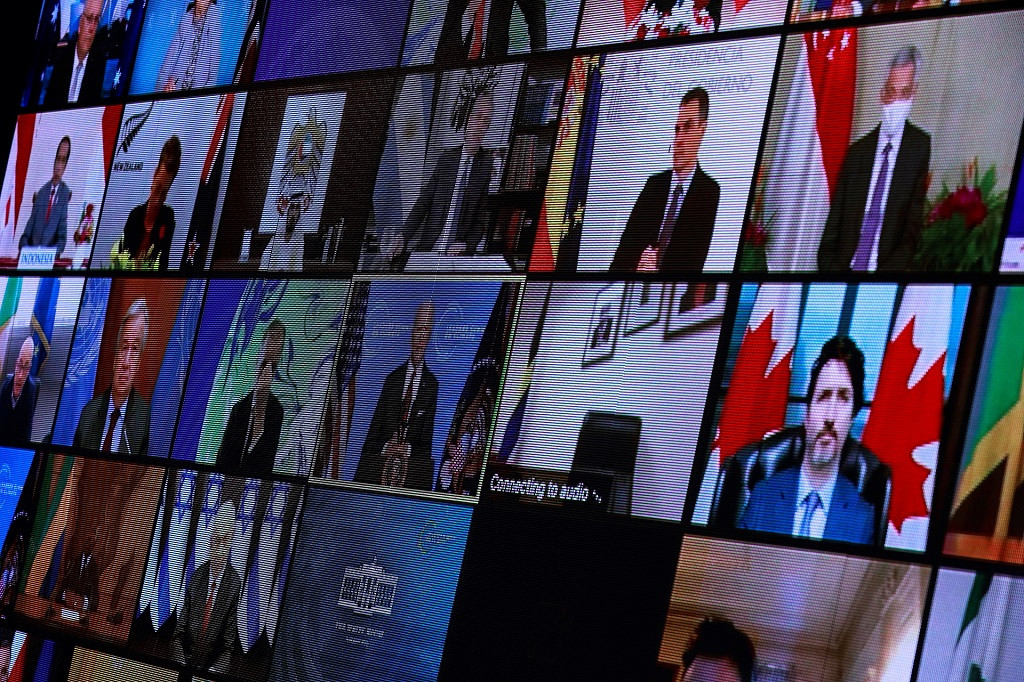Popular Reads
Top Results
Can't find what you're looking for?
View all search resultsPopular Reads
Top Results
Can't find what you're looking for?
View all search resultsJokowi dodges net-zero emissions pledge at climate summit
While reiterating Indonesia's commitment to tackling climate change, President Joko "Jokowi" Widodo failed to announce a net-zero emissions target for his own country during the recent climate summit.
Change text size
Gift Premium Articles
to Anyone
I
ndonesia has failed to make a stronger commitment to mitigate the climate crisis as President Joko “Jokowi” Widodo opts to shy away from declaring a net-zero emission pledge at a recent climate summit, when most leaders announced a tougher promise to address the matter.
The President attended the virtual climate summit hosted by United States President Joe Biden on Thursday, when 40 world leaders were expected to raise their ambitions in mitigating the crisis.
Jokowi opened his five-minute speech by reiterating Indonesia’s commitment to mitigating the crisis: “Indonesia is serious in tackling climate change and calls upon the world to take concrete actions.”
However, the President did not specify any net-zero emissions goal, or when Indonesia would reach a point of balancing out the greenhouse gases it emits to the atmosphere.
He only claimed that Indonesia had led the fight against anthropogenic climate change by example through, among other efforts, the moratorium on natural forest and peatland conversion that covered 66 million hectares – an area larger than the United Kingdom and Norway combined.
Under the moratorium, the government cannot issue new concession permits in primary forests and peatland. It was first introduced in 2011 and extended every two years, until President Jokowi issued a 2019 presidential instruction to make the policy permanent.
The moratorium was introduced in 2011 and extended every two years. In August 2019, President Jokowi issued a presidential instruction to make the policy permanent.
“Forest fires have also fallen by 82 percent at a time when some regions in America, Australia and Europe experienced the largest increase,” Jokowi went on to say.
In 2020, the National Disaster Mitigation Agency (BNPB) only recorded 328 forest and peatland fires, fewer than the 757 cases in the previous year. The agency argued the low number of wildfire cases last year was due to La Niña, the large-scale cooling of the ocean surface temperature in the Pacific Ocean that tends to trigger extreme weather of torrential rain and whirlwinds in Indonesia.
The Indonesian President said Indonesia looked forward to seeing “an implementable and balanced outcome” of the upcoming United Nations’ Climate Change Conference, or COP26, in Glasgow.
In contrast, several world leaders announced new climate pledges throughout the summit, which marked US’ return to the 2015 Paris Agreement after Biden’s predecessor, Donald Trump, had withdrawn from the accord.
Biden announced on Thursday that the US pledged to cut emissions by up to 52 percent by 2030. Previously, the country only targeted up to 28 percent emissions reduction by 2025.
Brazilian President Jair Bolsonaro, who had developed a reputation of being a climate-change skeptic, announced a vow for the country to be carbon neutral by 2050 -- an improvement from its previous pledge to reach net-zero emissions by 2060.
Prior to the US-hosted summit, Indonesian officials said the government was mulling to adopt a target of achieving net-zero emissions by 2070.
National Development Planning Agency (Bappenas) head Suharso Monoarfa recently said the agency had handed over the studies on possible climate scenarios for Indonesia to Jokowi, who will eventually decide which scheme the country would use to cut emissions.
However, Indonesia did not submit a more ambitious climate pledge and instead kept its previous Nationally Determined Contribution (NDC) of a 29 percent reduction in greenhouse gas emissions independently, or a 41 percent reduction with international assistance, by 2030.
During the summit, Jokowi said Indonesia welcomed other countries’ net-zero emissions targets by 2050. “Developing countries will follow suit if the developed nations support and are being credible with their commitments.”
“Indonesia is open for investments and transfers of technology, including for energy transition. There’s also great opportunities in the development of biofuels, the lithium battery industry and electric vehicles.”
Environmentalists slammed the President for failing to pledge a net-zero emissions target or make other ambitious climate pledges during the summit.
Greenpeace Indonesia climate campaigner Tata Mustasya criticized Jokowi for only displaying gimmicks instead of delivering a substantial message in addressing the climate crisis.
“It’s a race to the bottom that will only hurt not only the environment and climate, but also the economy. There won’t be economic strength without climate resilience,” Tata said.
Indonesia Forum for the Environment (Walhi) executive director Nur Hidayati said Jokowi’s speech showed a lack of sense of crisis as a head of state, although Indonesia had already suffered from the impact of the climate crisis.
She was referring to the tropical cyclone Seroja that triggered a series of floods and landslides in East Nusa Tenggara earlier this month. Hundreds of people were killed during the natural disasters, while thousands were forced to move to safer places.
“The summit was a missed opportunity for Indonesia because the President showed an ambiguous stance instead of taking leadership during the event,” Nur said.
Arief Wijaya of the World Resources Institute Indonesia (WRI Indonesia) said Indonesia was still waiting for support from developed countries in tackling the climate crisis before announcing a more ambitious goal. “Unfortunately, such a move blurs Indonesia’s commitment in achieving its NDC or net-zero emissions targets.”
However, Arief said he believed Indonesia could still contribute much in mitigating the climate crisis, as a Bappenas projection showed a possibility for Indonesia to achieve net-zero emissions before 2050.
The projected scenario would not sacrifice the economy as the country is forecast to experience at least 2 percent gross domestic product growth while transitioning to green development and a green economy.










